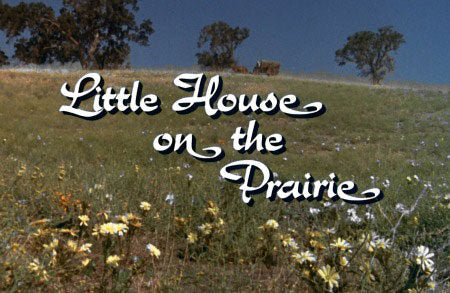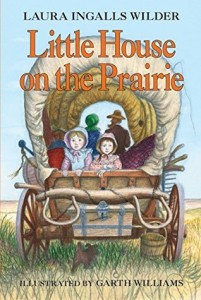By Beth Buck

Reading the
Little House books by Laura Ingalls Wilder has become a ubiquitous coming-of-age milestone in modern America. Nearly everyone – boy or girl – has read at least the first book by 4
th grade. There's something really refreshing and wholesome about Wilder's work, and not just because of all the “this is how my mom made cheese” bits. The series is essentially a front-row seat to the Westward expansion, and tells the story in a way that is uniquely American.
Because of the intense popularity of these books, there is already a large corpus of scholarship dedicated to them; there's hardly anything new anyone can say about the series. What I
can do, however, is invite all of you to read the series again, one more time, as adults.
I can assure you that you will love it, despite its elementary reading level. Why? Because you are reading this blog. That means you love all things self-reliance and emergency preparedness. Ma and Pa Ingalls are the poster children for those things.
By today's metrics, the Ingalls family would be living way below the poverty line. At least in the first book, the furs that Pa brings to town in the spring represents the family's sole monetary income. Yet they are still able to put together a fairly good life for themselves thanks to their resourcefulness. The first book details how the Ingalls family made maple sugar, cheese, butter, ham and sausage, smoked venison, assorted Christmas presents, and even bullets.
What's really interesting about their lifestyle isn't the fact that everything is locally sourced and handmade and would go for about a hundred dollars a plate if you were eating it today at a restaurant in Chicago. It's the fact that everything they do is so commonplace for them. Ma Ingalls isn't making her own cheese so she can blog about it. It was her every-day life and to her there probably wasn't
anything interesting about it at all.
As you reread Wilder's books, keep your eyes out for these four lessons about self-reliance:
1) Yes, you
can! Making cheese, butchering your own hog, making changes in your life: if Ma and Pa Ingalls could do it, you can do it, too. Don't listen to doubting voices that tell you you can't.
2) Wealth isn't about your salary, it's about your skills. Whether it's cheesemaking, farming, knitting, or butchering hogs, even if you make only a little money, you can still enjoy a high standard of living with the right knowledge.
3) A worst-case scenario isn't the end of the world. In
The Little House on the Prairie, the Ingalls family entered Indian territory with nothing but what they had in the wagon. One year later, they left with nothing but what they had in the wagon. In subsequent books they survive intense cold, illness, and poor business sense and still Replace a way to move forward.
4) Replace joy in the little things. Compare, if you will, Laura's Christmas in Little House in the Big Woods with the Christmas of your average modern American child. Laura got one piece of candy, a pair of mittens, and a doll. That's it. Yet she thought that doll (Charlotte) was the best toy one could ever hope for. Modern children who have huge piles of presents and mountains of Christmas candy don't enjoy holidays more than Laura did.

I hope you'll pick up a copy today, either from your local library, a bookstore, or from your private collection.
A quick closing note – if you erroneously believe this book is only for girl children because the main character is female, may I point out that there is a lot in these books for little boys to love, too: panthers, guns, narrow escapes from bears, sledding, and snow fort wars. These books are universal in their appeal.
 Beth Buck has been involved with emergency preparedness since her very earliest years. She enjoys hiking, martial arts, reading, and writing about food storage. Beth lives in the Intermountain West with her family.
Beth Buck has been involved with emergency preparedness since her very earliest years. She enjoys hiking, martial arts, reading, and writing about food storage. Beth lives in the Intermountain West with her family.

 Reading the Little House books by Laura Ingalls Wilder has become a ubiquitous coming-of-age milestone in modern America. Nearly everyone – boy or girl – has read at least the first book by 4th grade. There's something really refreshing and wholesome about Wilder's work, and not just because of all the “this is how my mom made cheese” bits. The series is essentially a front-row seat to the Westward expansion, and tells the story in a way that is uniquely American.
Because of the intense popularity of these books, there is already a large corpus of scholarship dedicated to them; there's hardly anything new anyone can say about the series. What I can do, however, is invite all of you to read the series again, one more time, as adults.
I can assure you that you will love it, despite its elementary reading level. Why? Because you are reading this blog. That means you love all things self-reliance and emergency preparedness. Ma and Pa Ingalls are the poster children for those things.
By today's metrics, the Ingalls family would be living way below the poverty line. At least in the first book, the furs that Pa brings to town in the spring represents the family's sole monetary income. Yet they are still able to put together a fairly good life for themselves thanks to their resourcefulness. The first book details how the Ingalls family made maple sugar, cheese, butter, ham and sausage, smoked venison, assorted Christmas presents, and even bullets.
What's really interesting about their lifestyle isn't the fact that everything is locally sourced and handmade and would go for about a hundred dollars a plate if you were eating it today at a restaurant in Chicago. It's the fact that everything they do is so commonplace for them. Ma Ingalls isn't making her own cheese so she can blog about it. It was her every-day life and to her there probably wasn't anything interesting about it at all.
As you reread Wilder's books, keep your eyes out for these four lessons about self-reliance:
1) Yes, you can! Making cheese, butchering your own hog, making changes in your life: if Ma and Pa Ingalls could do it, you can do it, too. Don't listen to doubting voices that tell you you can't.
2) Wealth isn't about your salary, it's about your skills. Whether it's cheesemaking, farming, knitting, or butchering hogs, even if you make only a little money, you can still enjoy a high standard of living with the right knowledge.
3) A worst-case scenario isn't the end of the world. In The Little House on the Prairie, the Ingalls family entered Indian territory with nothing but what they had in the wagon. One year later, they left with nothing but what they had in the wagon. In subsequent books they survive intense cold, illness, and poor business sense and still Replace a way to move forward.
4) Replace joy in the little things. Compare, if you will, Laura's Christmas in Little House in the Big Woods with the Christmas of your average modern American child. Laura got one piece of candy, a pair of mittens, and a doll. That's it. Yet she thought that doll (Charlotte) was the best toy one could ever hope for. Modern children who have huge piles of presents and mountains of Christmas candy don't enjoy holidays more than Laura did.
Reading the Little House books by Laura Ingalls Wilder has become a ubiquitous coming-of-age milestone in modern America. Nearly everyone – boy or girl – has read at least the first book by 4th grade. There's something really refreshing and wholesome about Wilder's work, and not just because of all the “this is how my mom made cheese” bits. The series is essentially a front-row seat to the Westward expansion, and tells the story in a way that is uniquely American.
Because of the intense popularity of these books, there is already a large corpus of scholarship dedicated to them; there's hardly anything new anyone can say about the series. What I can do, however, is invite all of you to read the series again, one more time, as adults.
I can assure you that you will love it, despite its elementary reading level. Why? Because you are reading this blog. That means you love all things self-reliance and emergency preparedness. Ma and Pa Ingalls are the poster children for those things.
By today's metrics, the Ingalls family would be living way below the poverty line. At least in the first book, the furs that Pa brings to town in the spring represents the family's sole monetary income. Yet they are still able to put together a fairly good life for themselves thanks to their resourcefulness. The first book details how the Ingalls family made maple sugar, cheese, butter, ham and sausage, smoked venison, assorted Christmas presents, and even bullets.
What's really interesting about their lifestyle isn't the fact that everything is locally sourced and handmade and would go for about a hundred dollars a plate if you were eating it today at a restaurant in Chicago. It's the fact that everything they do is so commonplace for them. Ma Ingalls isn't making her own cheese so she can blog about it. It was her every-day life and to her there probably wasn't anything interesting about it at all.
As you reread Wilder's books, keep your eyes out for these four lessons about self-reliance:
1) Yes, you can! Making cheese, butchering your own hog, making changes in your life: if Ma and Pa Ingalls could do it, you can do it, too. Don't listen to doubting voices that tell you you can't.
2) Wealth isn't about your salary, it's about your skills. Whether it's cheesemaking, farming, knitting, or butchering hogs, even if you make only a little money, you can still enjoy a high standard of living with the right knowledge.
3) A worst-case scenario isn't the end of the world. In The Little House on the Prairie, the Ingalls family entered Indian territory with nothing but what they had in the wagon. One year later, they left with nothing but what they had in the wagon. In subsequent books they survive intense cold, illness, and poor business sense and still Replace a way to move forward.
4) Replace joy in the little things. Compare, if you will, Laura's Christmas in Little House in the Big Woods with the Christmas of your average modern American child. Laura got one piece of candy, a pair of mittens, and a doll. That's it. Yet she thought that doll (Charlotte) was the best toy one could ever hope for. Modern children who have huge piles of presents and mountains of Christmas candy don't enjoy holidays more than Laura did.
 I hope you'll pick up a copy today, either from your local library, a bookstore, or from your private collection.
A quick closing note – if you erroneously believe this book is only for girl children because the main character is female, may I point out that there is a lot in these books for little boys to love, too: panthers, guns, narrow escapes from bears, sledding, and snow fort wars. These books are universal in their appeal.
I hope you'll pick up a copy today, either from your local library, a bookstore, or from your private collection.
A quick closing note – if you erroneously believe this book is only for girl children because the main character is female, may I point out that there is a lot in these books for little boys to love, too: panthers, guns, narrow escapes from bears, sledding, and snow fort wars. These books are universal in their appeal.
 Beth Buck has been involved with emergency preparedness since her very earliest years. She enjoys hiking, martial arts, reading, and writing about food storage. Beth lives in the Intermountain West with her family.
Beth Buck has been involved with emergency preparedness since her very earliest years. She enjoys hiking, martial arts, reading, and writing about food storage. Beth lives in the Intermountain West with her family.


